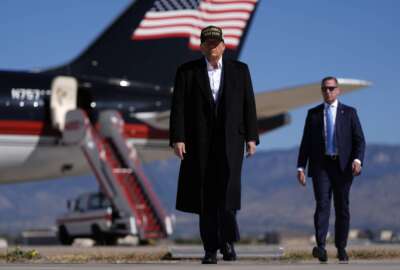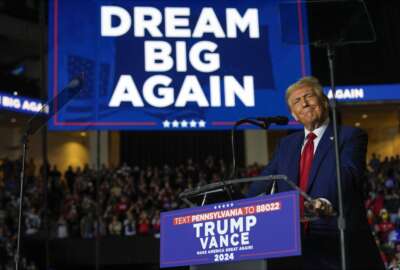Exclusive
Pulse Poll: Majority of feds putting mission over politics
Federal News Network conducted an online survey to gauge federal employees’ feelings after the election of Donald Trump as president.
Worried about Schedule F and the future of your job? Excited to see if DOGE can improve government efficiency? Want to know more about the proposed pick to head up your department? Federal News Network is tracking all things transition-related, as the 47th administration’s plans for the federal workforce take shape. Visit our Tracking the Transition page to keep up with the latest developments.
With the threat of the return of Schedule F and other potential changes outlined in Project 2025 hanging over the heads of the federal workforce, employees are not polishing their resumes or running for the job boards after the results of the election bringing Donald Trump back to the White House.
A Federal News Network “Pulse Poll” found 42% of the more than 1,000 respondents plan on staying in their jobs and another 41% say they are taking a “wait and see” approach before jumping ship. Federal News Network conducted the online survey of its audience from Nov. 6-7.
“Ridiculous to even consider ceasing to serve my country over petty politics,” wrote one respondent.
Another said, “I plan to continue to work for the people I serve to the best of my ability. I love my job and the election didn’t change that. I still feel a sense of responsibility and pride in my agency and the current position I hold.”
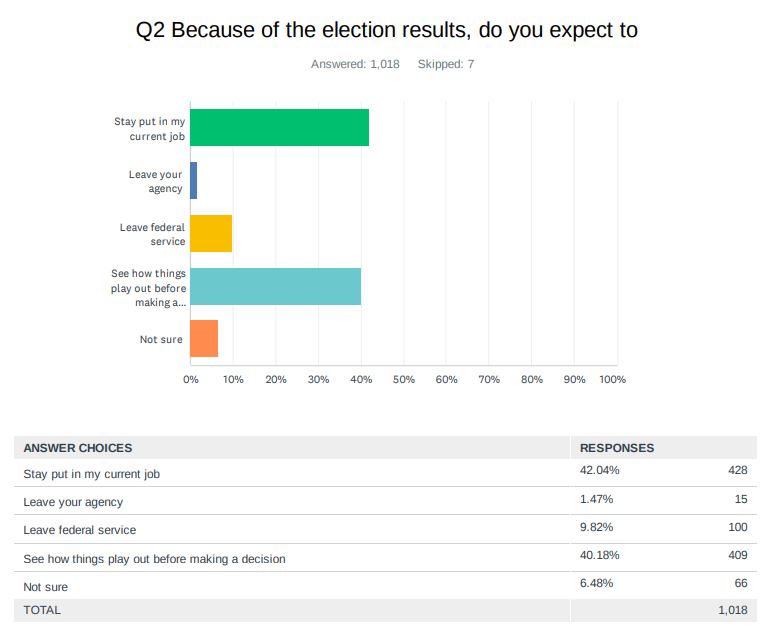
Other federal employees said they were more likely to retire or planned on retiring soon anyway, and the election didn’t change their minds.
Of the 11% who said they would be leaving their agency or federal service, their reasons ranged from politics, saying “enough is enough,” to expectations of cuts and possible layoffs.
“I expect to leave within the first year of the incoming administration. I believe the civil service workforce will be significantly reduced under a second Trump administration and many staff will either have to leave or face being fired,” one respondent wrote.
The fact that respondents are not running for the hills and seem to be taking a pragmatic view of the election is a good thing for agencies.
A mass exodus of employees for any organization would be extremely problematic.
At the same time, respondents are not as confident in their co-workers staying at their agency.
Almost 40% say they expect “many” or “some” to leave their office because of the election.
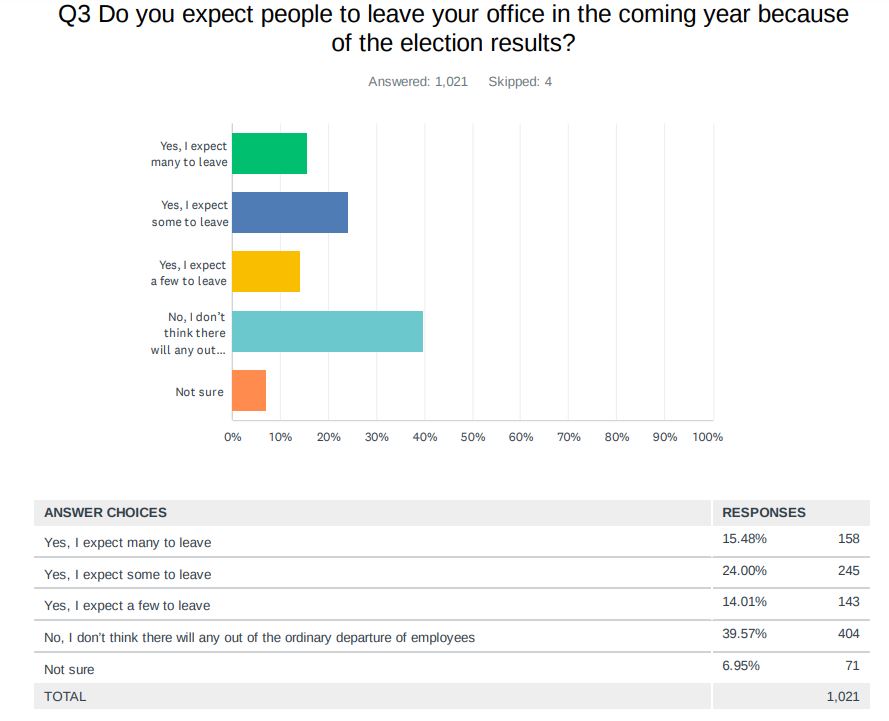
“Those who can retire will be more likely to leave sooner under an administration that will make things harder than they already are working in the federal government,” wrote one respondent.
Another said, “Yes, I expect the retirement wave will finally hit the federal government before Schedule F is fully implemented and 100,000 plus career civil servants are expelled from their federal service. I’m leaving before the inauguration.”
Still, many others said there are plenty of reasons to stay, and still others say it depends on possible budget cuts, reductions in benefits or other factors that may or may not come to fruition.
Others say a lot of it depends on the remote working or teleworking policies the new leadership brings in.
“If we have to go back in the office full time, people will leave. We have data that verifies that we are more efficient and effective remote working and if that changes, people will leave,” wrote one respondent.
In fact, when asked about whether the new administration would reduce remote or telework, almost 67% of the respondents agreed that it would.
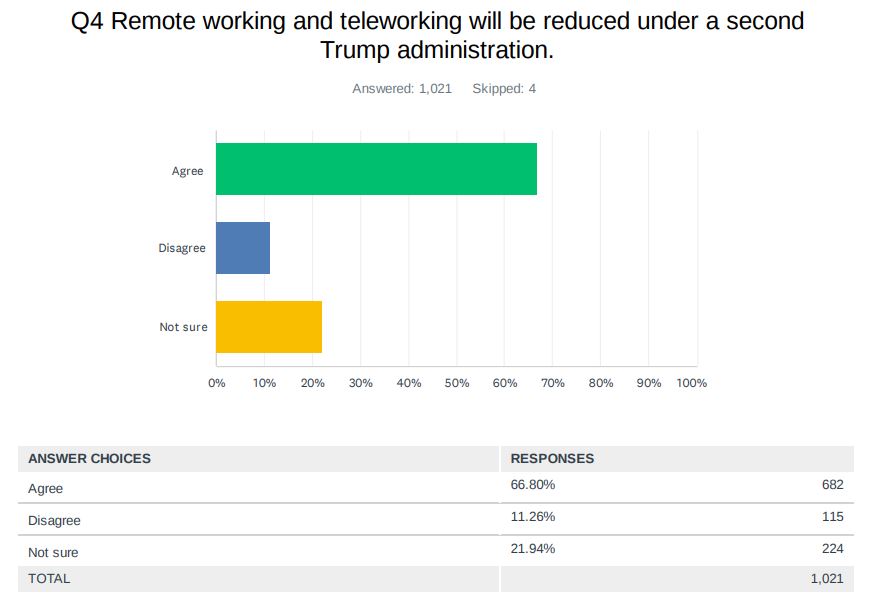
Many respondents said of all their concerns, reduction in telework and remote working was among their biggest.
“Easiest way to get people to quit, which is what they will want,” wrote one respondent.
Another said they hope new leadership focuses on what the data says about telework and remote work: “I believe telework and remote work make sense to anyone who is willing to make data driven decisions versus knee-jerk presentation oriented decisions. The Trump administration will likely assess the data and determine where it makes sense. I don’t think there will be a retreat from the remote/telework where it makes sense. If you’re worth your salt as a supervisor and you know how to supervise employees for productivity, I don’t think it matters much. Most draconian, butts in seats equal work ideology and methodology has been debunked over time and COVID was our digital transformer, and the data is in. Coming to the office isn’t a reliable determining factor for efficiency or getting things done; but it is a requirement for some positions. I think this balance has been rightsizing for the past 4 years. I believe it will continue especially when aligned with the cost of maintaining expensive government brick and mortar facilities.”
Still others worried whether their offices even have enough space for most employees to return five days a week.
And there were several respondents who said it’s time to end telework and remote work.
“I hope it does. Teleworkers are not near as productive doing their jobs they are getting paid to do. Many teleworkers take advantage of teleworking and also it limits relationship building and important collaboration,” wrote one respondent.
Federal employees who responded to the survey were less optimistic about possible changes to their missions and budgets under the Trump administration.
More than half of those who responded say they expect their budgets or missions to decrease significantly or slightly, while just over 12% said their expected their missions and budgets to stay the same.
Generally respondents who work at places like the Defense Department or other national security agencies feel more optimistic about their budget and mission futures, while others who work at places like the Environmental Protection Agency or the Justice Department expressed more concerns.
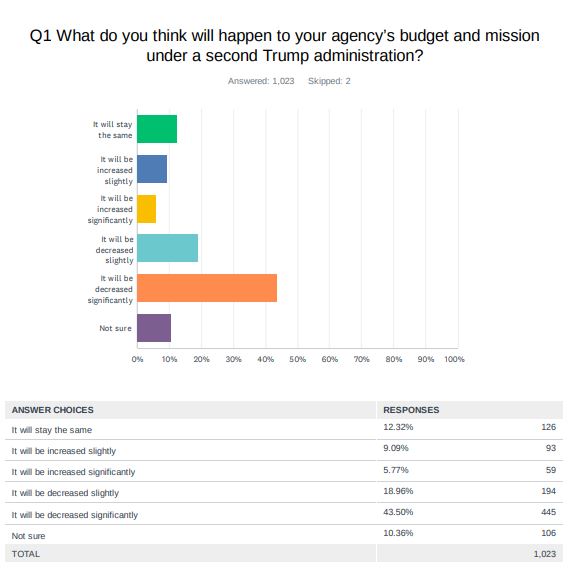
“I’m at State. I imagine Trump’s America First approach will diminish our diplomatic mission. The hiring freeze in 2017-2018 did long term damage,” wrote one respondent.
Another said, “I think our budget will be slashed — since we have hired significantly in the last four years, I think the agency will be facing a RIF next year.”
Others are more optimistic about the impact the Trump administration will have on agencies.
“The first Trump administration ‘right-sized’ much within government, and the second will do the same,” wrote another respondent.
And another said a decrease in budget would be a good thing. “Frankly, I am hoping for cuts to our agency as we are bloated but no one wants to admit that.”
A third person even harkened back to the Clinton administration saying, “A 1993 Reinventing Government type overhaul would be welcome.”
Copyright © 2025 Federal News Network. All rights reserved. This website is not intended for users located within the European Economic Area.
Jason Miller is executive editor of Federal News Network and directs news coverage on the people, policy and programs of the federal government.
Follow @jmillerWFED




